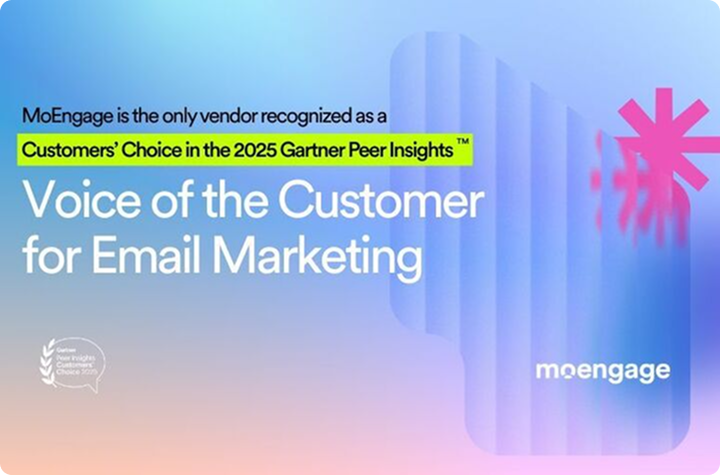Customer Engagement Deep Dive: How to Build Personalized Cross-Channel Journeys
Learn More
We have heard of accelerators and incubators around the world that assist and invest in startups. But Unilever has taken an innovative approach to scale startups and build partnerships. Their most recent venture, called the ‘Unilever Foundry,’ works with upcoming builders and drives growth for both the corporation and startup.
Based on this chat with MoEngage, here are some of the key takeaways from an organisation like Unilever Foundry:
At first glance, the idea of Unilever Foundry would sound like any other accelerator or incubator. However, they are far from those cliches.
They started in London as part of the marketing department of Unilever. The intention was to address the needs of online marketing and digital transformations. In a few years and a few wins under their belt, they decided to move the initiative to include other industries.
“The idea is to acknowledge that technology is moving fast, and this [the foundery] is the way to bring them into our business,” said Guerpillon. The foundry falls under the marketing limb and not R&D because of this approach.
Unilever is not looking for startups to nurture and fund like an incubator; they are looking for business opportunities. They go out of their way to look for establishments that fulfil the needs of the business and ensure they are handsomely compensated and guided in the process.
“This is a double-way bridge,” said Guerpillon. “If you go out and try to knock on the door of a company like Unilever, it’s firstly hard to find the right door.” Many startups looking to work with larger organisations do not have the right timing or the resources. Unilever Foundry can, however, cherry-pick companies based on the present business needs.
Secondly, they can gauge the connection between the needs inside the business and the market outside. They can study the next innovation that needs a push and then find the appropriate startup in the domain.
This program is the best option for startups to work directly with a company as large as Unilever. “Most times we wish these startups work with more than just us, then we know they are sustainable,” she adds.
Level3 is the co-working-space-like setup for the companies that work with Unilever Foundry. At any time, they host between five and ten startups to ensure they are given sufficient attention needed to scale.
The foundry focuses on five markets, namely: Marketing at tech, Data & AI, Logistics and Ecom, Food and Agro-tech, and Sustainable technology. A startup can also rent a desk and sign up as part of the mentoring program.
The partner companies of Unilever also use this ecosystem as an avenue to scout for new technologies.
There is a perception about the difficulty in working between a startup and a giant corporation. While one is newer and still adapting to work culture, the corporation is known to play by a rulebook.
However, establishments have to see this as an opportunity to engage with different corporations. They are receiving a chance to provide them with significant revenue and a market for the technology.
Unilever is also very cognizant of the companies they sign. They primarily work with series-A or pre-Series A startups. This stage shows that the founders are a few steps into building the business and will not remain overwhelmed by the workings of corporations.
We can break down the objectives of this venture into two:
It’s clear that the company does not just invest money or opportunities into a startup. They are here to solve a business problem. It’s a collaborative effort where both sides are to gain. The startup can find a market for the technology, while the corporation can solve its shortcomings.
Secondly, procurement is the hardest part of working with a corporation. Working with giants can get more demanding, so startups need to find the right teams to work with inside the corporations. Once this connection is clear, the work goes on smoother than ever.
According to Barbara Guerpillon, the best way to gauge the success of these ventures is by looking at the change in key performance indicators from the start of the project to the present day.
At the start, the KPI for Unilever was “startups conceived to work with the foundry.”
When they run a pilot project, there is a demand to put money on the table. This investment forces companies to work as a part of Unilever and generate results in harmony.
Now that the business trusts the foundry, they measure their success by seeing many startups can reach scaling size. The process starts with a pilot project, then moves into iterations and brand additions, after which they begin to measure results.
Today the foundry sees it as their role to identify the opportunity to impact a project at scale.
Understanding what the next few projects for the foundry are will help gauge the direction of the venture. Here are some of the domains that Unilever Foundry is looking to step into in 2021 and beyond.
Be the first to access actionable reports, guides, tips, videos, podcasts from experts in Customer Engagement, retention and more!





MoEngage is an insights-led platform trusted by 1,350+ global brands like McAfee, Flipkart, Domino’s, Nestle, Deutsche Telekom, and more. MoEngage’s powerful analytics, personalization, and AI capabilities give a 360-degree view of your customers and help you create journeys across digital channels.
© Copyright 2025 MoEngage. All Rights Reserved.

Please wait while you are redirected to the right page...
